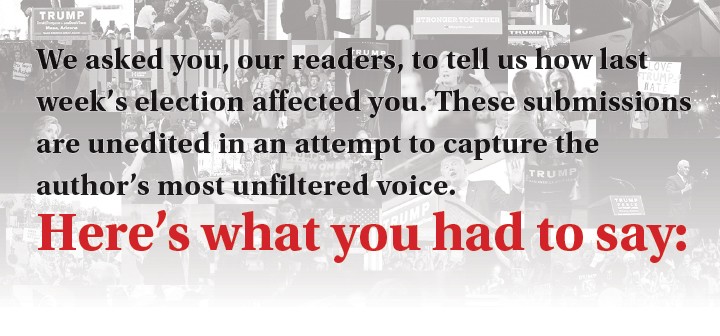Noah Timothy Gabrielsen, UA political science student
I watched Hillary Clinton’s concession speech with tears in my eyes. It was sincere, gracious, and uplifting.
Can anyone imagine Donald Trump giving a concession speech like that? It would seem impossible, as those three words that are the antithesis of Donald Trump and the campaign he ran.
However, I’m sure there will be plenty of other opinions published which address the inflammatory and prejudicial nature of the Trump campaign, so I will instead talk about another one of my takeaways from the election. Simply put, on November 8th the voters emphatically rejected any notion that facts and rational though are the crux of American democracy.
This election was a referendum on reality, and the American electorate truly let the world down. The world view which Trump espouses (and apparently with which a sizeable portion of the American populace agrees) is not based on logic or reasoning.
Climate change is a scientific fact, but President-elect Trump believes it is a hoax. The crime rate is historically low, but Newt Gingrich thinks it is more important that “people feel more threatened” than in years past.
Unemployment is down to 4.9 percent and the Dow is reaching record highs, but the Republican Party wants us to believe the economy is in shambles. And we just handed them control of all three branches of the federal government.
President-elect Trump built his presidential bid not just on these obvious distortions of reality, but also on vague and grandiose promises in the hopes that the American people could not be bothered to demand more from him.
Since the election last Tuesday, it appears he was entirely justified in making this bet.
Perhaps the most egregious example of empty rhetoric was the “drain the swamp” mantra from the Trump campaign. Voters bought into these hollow words so easily, and yet we now see a transition team filled by current and former Republican members of Congress.
This was predictable, of course, to the seasoned observer, but the fact that voters were so easily duped is nonetheless alarming.
I think we can all agree that ideology and policy took a backseat this election. We all share an idealistic view of politics where decisions are based on merit and rationality, yet it seems that we have collectively done little to foster such an environment.
Voters were so easily swindled this election because political discourse is difficult. It does not feel good to be told you are wrong. It does not feel good to have your ideas challenged.
Instead, we rely on social media snippets, headlines, and flat-out propaganda which reinforce our individual world views.
Regrettably, I am not hopeful for the situation to improve in the coming years. However, so long as we can agree that there is a problem, each of us has an individual duty to resurrect thoughtful and civil political discussion whenever and wherever possible.
Alan Ziegler, UA systems administrator
Thinking about the divisions in our country politics: James Madison talked about the importance of many small factions, each pursuing their own unique interests, would make it hard for a tyrannical majority to form as a voting block to oppress any particular minority.
The factions would align differently on each issue. I am in no way suggesting we have a tyrannical majority, but I wonder if what is mainly a two party political system, depending on unity within each party which seems higher today than historically where conservatives, moderates, and liberals were members of each party (as one way of categorizing factions but not the only way), and particularly now where each party is supported by nearly half of the electorate, does not weaken Madison’s hope for the benefit of many small factions. Perhaps if we had more than primarily two parties with voting power and no one party with a majority, our political decisions would be based on a coalition of parties on any particular issue.
If it takes two of three parties to reach a majority, decisions might actually be made by a super majority instead of a sometimes highly divisive 51% majority and might be more informed and representative of all citizens.
Multiple parties would in some ways be closer to the many small factions that Madison envisioned. However, it seems additional parties have a nearly impossible high bar to overcome to be elected.
Perhaps we also need more prevalent kinds of proportional election rather than winner-take-all. Maine and Nebraska have started down this road with the electoral college, but that is not the only way proportional voting could improve on winner-take-all.
We might look for ideas about proportional voting and multiple political parties from the best implementations in European representative democracies.
It would not be in the interest of the U.S. major parties to support proportional voting and multiple parties. It can probably only come from a grass roots effort.
Sean Currey, UA creative writing, psychology, and linguistics student
I’m a “non-traditional” student at UA, so I’ve been disappointed with elections before (e.g., George W. Bush vs. Al Gore in 2000).
And I was disappointed that the choices in 2016 came down to Hillary Clinton and Donald Trump when I had supported Bernie Sanders.
But I voted for Clinton in general election because she’s qualified; she has the experience necessary to run the country. In contrast, Trump not only lacks any experience in government, he lacks the moral character expected of anyone occupying the Oval Office.
Forget about Trump’s troubling past. Forget the fact that his first wife Ivana was granted divorce from him due to “cruel and inhuman treatment.” Forget that he’s been married three times and cheated on his first two wives (and boasted on a hot mic that he attempted to cheat on the third). Forget that six Trump companies sought bankruptcy protection during the 1990s and 2000s (including three casinos—how does a casino lose money?). Forget that he claimed a $909 million loss on his 1995 tax return—and that we still don’t know if he’s paid taxes since. Try to focus only on his behavior during the past 17 months.
For anyone who might need a refresher, I’ve included an incomplete list below.
Trump called undocumented Mexican immigrants drug dealers and rapists, mocked Senator John McCain for being captured during the Vietnam war, repeatedly defended himself for calling women “fat” and “disgusting,” mocked a journalist with arthrogryposis, suggested banning all Muslims from entering the US, suggested that women who have abortions should be punished, declared that US District Court Judge Gonzano Curiel couldn’t be impartial during the lawsuit over Trump University (“He’s a Mexican”), criticized Khizr Khan (father of deceased US Army Captain Humayan Kahn) for denouncing his statements about Muslims, described Hillary Clinton as “the devil,” stated that President Barack Obama founded ISIS, suggesting bringing back “stop and frisk,” suggested that veterans with PTSD are weak, dismissed his bragging of grabbing women by the genitals as “locker room talk,” and during the last presidential debate, called former First Lady, Senator, and Secretary of State Hillary Clinton a “nasty woman.”
How could anyone vote for a guy like this? How could 60 million people push all of the garbage above out of their minds and convince themselves that a person who behaves this way is an acceptable choice for President of the United States?
I spent several years working for a Fortune 500 company, and conduct like this would have never been tolerated at any level under any circumstances.
This isn’t the behavior of a tough businessman or a shrewd negotiator; it’s the behavior of a fifth-grade bully. Most of us wouldn’t stand for this sort of conduct if we saw it on the playground. Why would we tolerate it in a president?
The only way to deal with a bully is to stand up to him. If you don’t stand up now, you only pave the way for future bullies. Stand up!
Liang Wu, UA international student
As an international student and a Chinese, racism is one thing I worry about after the election. Look at the stories told just days after the election #TrumpsAmerica.
You may think that these stories are silly. But some people shouted white power at me a few years ago on the 6th Street. Being kind to one another, understanding each other’s differences, and not judging people by their color are really fundamental things a society should embrace.
I understand election is always very personal. A student told me that he’s worried Hillary might put big tax on those people who make more than $250,000 a year and he thought Trump’s a good businessman and he could save the economy. A mom told me she’s worried about the rising cost of health insurance.
These are genuine concerns. However, I can only be pessimistically optimistic and hope for the best. For now, I won’t stay late in office and I won’t go to an extremely red state until I understand more where things are going. To be frank, I’m a bit scared.















